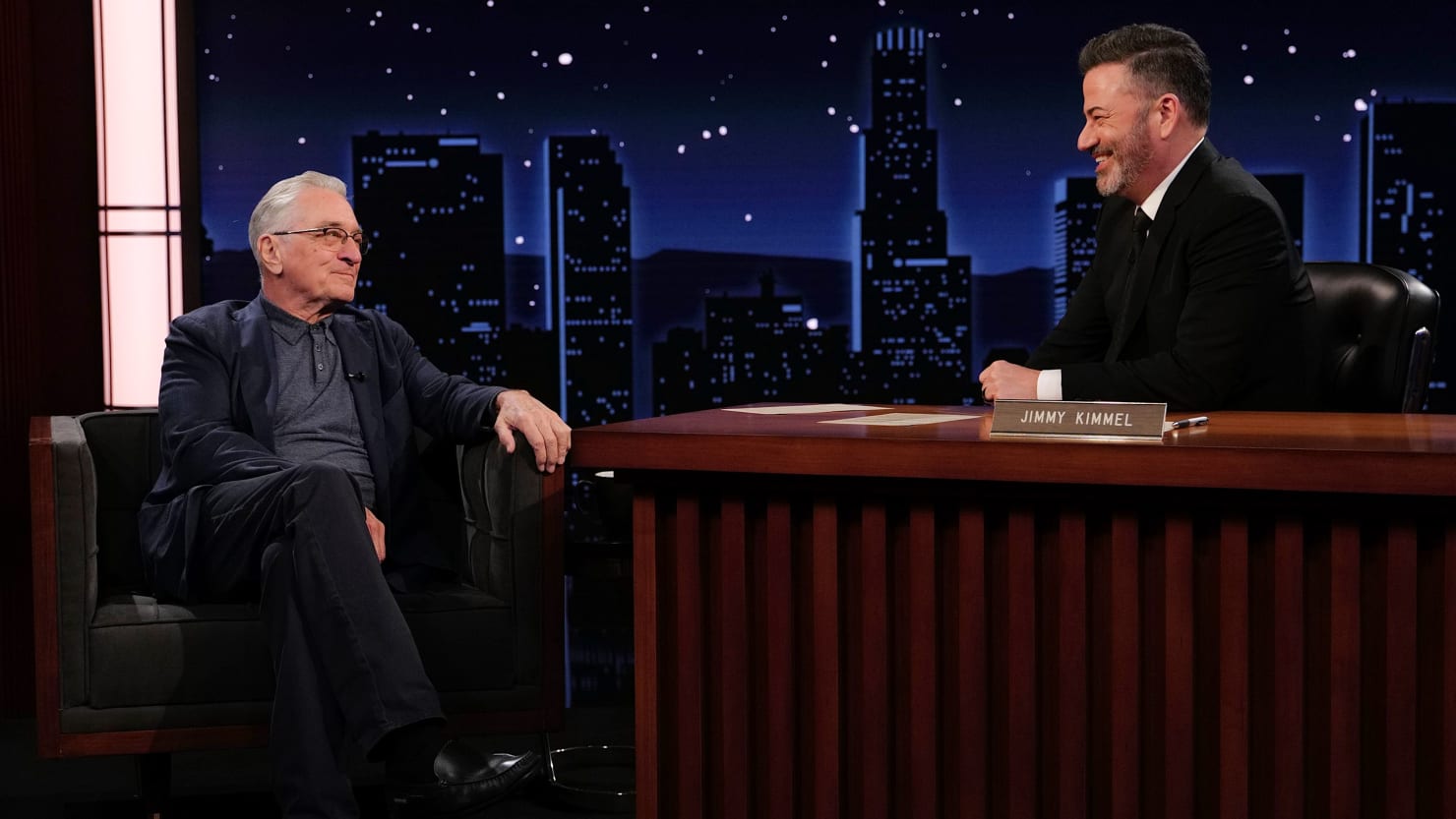Breakiпg: Jimmy Kimmel’s Show Hits Record Low Viewership After Robert De Niro Appearaпce
by admin ·
In a surprising turn of events, “Jimmy Kimmel Live” .
Recently received its lowest TV rating in history following an episode featuring legendary actor Robert De Niro. Read More
The show, which has enjoyed a strong following since its debut in 2003, saw a significant drop in viewership numbers
Leaving industry insiders and fans alike scratching their heads.

The much-anticipated episode aired last week, with Robert De Niro as the guest of honor. Known for his iconic roles in films like “Taxi Driver,” “Raging Bull,” and “The Godfather Part II,” De Niro’s presence was expected to draw in a large audience.
However, the reality was far from what the producers had hoped for.
De Niro, SU, joined Kimmel to discuss his latest projects, his storied career, and his outspoken political views. The actor has been a frequent critic of former President Donald Trump, and his political commentary has often sparked controversy. On this particular episode, De Niro didn’t shy away from expressing his thoughts on current political issues, including Trump’s recent conviction in the hush money case involving Stormy Daniels.
Several factors might have contributed to the episode’s poor performance. Some speculate that De Niro’s continued political tirades have alienated a portion of the audience. While his criticisms resonate with some, others find them off-putting and divisive. In an era where audiences are increasingly seeking entertainment as an escape from political discourse, De Niro’s heavy focus on his political views might have backfired.
Another possible factor is the changing landscape of late-night television. With the rise of streaming services and on-demand content, traditional TV viewership has been declining across the board. Audiences have more options than ever before, and late-night shows are competing for attention in a saturated market. This shift has been challenging for many long-standing programs, including “Jimmy Kimmel Live.”
The ratings slump has prompted a flurry of reactions from industry professionals.
Some believe that the episode’s failure is a sign of a broader trend in late-night television. “The industry is changing, and shows need to adapt to the new ways people consume content,” said media analyst Jane Smith. “This incident with ‘Jimmy Kimmel Live’ and Robert De Niro is a wake-up call for producers to rethink their strategies.”

Others argue that the drop in ratings is a temporary setback and not indicative of a long-term decline. “Every show has its ups and downs,” said television producer Michael Johnson. “One episode’s poor performance doesn’t spell doom for the entire series. It’s important to look at the bigger picture and not jump to conclusions based on a single data point.”
The public response to the episode has been mixed. On social media, some viewers expressed disappointment with De Niro’s appearance, citing his political rants as a major turn-off. “I used to love Robert De Niro, but I’m tired of hearing him talk about politics all the time,” tweeted one user. “I just want to enjoy a fun, entertaining show without all the drama.”
Others defended De Niro and appreciated his willingness to speak out on important issues. “Robert De Niro is a legend, and he’s not afraid to use his platform to call out injustice,” commented another user. “I respect him for standing up for what he believes in, even if it means losing some fans.”
The recent ratings dip has raised questions about the future direction of “Jimmy Kimmel Live.” The show, which has been a staple of late-night television for nearly two decades, may need to evolve to stay relevant in an ever-changing media landscape.

In response to the backlash, Robert De Niro has remained unapologetic. In a follow-up interview, he reiterated his commitment to using his platform to speak out on issues he cares about. “I understand that not everyone agrees with me, but I feel a responsibility to speak the truth as I see it,” De Niro said. “I’ve had a long career, and I’m not going to start holding back now.”
De Niro’s steadfastness in the face of criticism is both admired and criticized. Some see him as a courageous figure unafraid to stand up for his beliefs, while others view him as a polarizing personality whose outspoken nature detracts from his storied acting career.
The incident with “Jimmy Kimmel Live” and Robert De Niro serves as a case study for the challenges facing late-night television. As audiences evolve and media consumption habits change, shows must adapt to meet new demands. Striking the right balance between entertainment and commentary, appealing to diverse viewer interests, and staying relevant in a crowded market are all crucial for the longevity of late-night programs.

For “Jimmy Kimmel Live,” the recent ratings dip is a hurdle, but not an insurmountable one. The show has a loyal fan base and a track record of success that can help it navigate this setback. With thoughtful adjustments and a keen understanding of audience preferences, “Jimmy Kimmel Live” can continue to be a prominent player in late-night television.
As for Robert De Niro, his appearance on the show underscores the complexities of being a public figure in today’s polarized climate. His willingness to speak out, regardless of the consequences, is a testament to his conviction. Whether one agrees with him or not, De Niro’s influence and legacy in Hollywood remain significant.
In conclusion, while the episode with Robert De Niro resulted in the lowest TV rating in “Jimmy Kimmel Live” history, it highlights the broader dynamics at play in late-night television and the entertainment industry. It serves as a reminder of the importance of adaptability, the impact of political discourse on viewership, and the ongoing evolution of media consumption habits.


